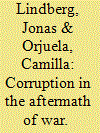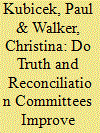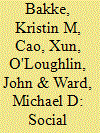| Srl | Item |
| 1 |
ID:
133423


|
|
|
|
|
| Summary/Abstract |
'Corruption in the aftermath of war' brings together an interdisciplinary group of scholars to enquire into the dynamics of corruption in post-conflict societies. This introduction discusses five themes, problematising and summarising key findings from the 10 articles included. First, we discuss the problems with the corruption concept, related to its moralising connotations and definitional vagueness, and propose viewing corruption as a collective action dilemma as a way of avoiding these moralising aspects. Second, we discuss post-conflict societies, and highlight the great varieties of 'peace' that that label can refer to. We suggest that the causes, dynamics and effects of corruption in post-conflict societies bear many similarities with those in other societies, but that the post-conflict situation often generates an intensification and entrenchment of corruption-related problems. Third, we analyse the dynamics between international interveners and domestic actors, and show the contradictions and tensions in international-domestic relations. Fourth, we argue that the inter-linkages between inequality, mistrust and corruption deserve consideration in the study of post-conflict societies, and that inequality in particular merits more attention. Finally, we discuss some methodological challenges encountered by the contributors in their studies of corruption in post-conflict societies.
|
|
|
|
|
|
|
|
|
|
|
|
|
|
|
|
| 2 |
ID:
174420


|
|
|
|
|
| Summary/Abstract |
This article examines the impact of truth and reconciliation committees (TRCs) on human rights in Africa. It examines the effects of fifteen different TRCs from 1984–2014, and fills a gap in the existent literature by developing measures to assess the strength of each TRC. Many African TRCs are quite weak. Nevertheless, the study does not find that stronger TRCs are more successful in terms of human rights outcomes. While not dismissing the value of TRCs, this work discusses limitations of quantitative studies on their impact.
|
|
|
|
|
|
|
|
|
|
|
|
|
|
|
|
| 3 |
ID:
086960


|
|
|
|
|
| Publication |
2009.
|
| Summary/Abstract |
This article examines attitudinal differences and similarities among ethnic groups in conflict-affected societies. Conventional wisdom tells us that societies that have experienced violent struggles in which individuals of different ethnic groups have (been) mobilized against each other are likely to become polarized along ethnic lines. Indeed, both policy-makers and scholars often assume that such divisions are some of the main challenges that must be overcome to restore peace after war. We comparatively examine this conventional wisdom by mapping dimensions of social distance among 4,000 survey respondents in Bosnia-Herzegovina and the North Caucasus region of Russia. The surveys were carried out in December 2005. Using multidimensional scaling methods, we do not find patterns of clear attitudinal cleavages among members of different ethnic groups in Bosnia-Herzegovina. Nor do we find patterns of clear ethnic division in the North Caucasus, although our social distance matrices reveal a difference between Russians and ethnic minority groups.
|
|
|
|
|
|
|
|
|
|
|
|
|
|
|
|